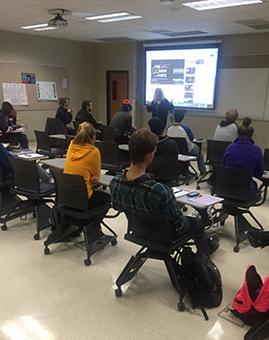Media Studies suspension still in process
At College of BILSA meeting the future of Media Studies was discussed amongst faculty

Mary Rose Williams teaches media studies students about theories of media and culture.
On Wed. Nov. 9, the School of Business had their faculty meeting where the Dean of the College of Business, Industry, Life Science, and Agriculture, Dr. Wayne Weber discussed state funding dropping dramatically and how the college grew as a whole while the media studies program did not. Weber reiterated his statement from a previous student forum that they are committed to the faculty and students from the program and intend on development of the Public Relations program and expansion of sales and marketing areas. Many of these topics he discussed overlapped with what was said at the forum on Oct. 24.
After Weber’s presentation, business professor Margaret Karsten mentioned that there must be a certain governance process for these situations. There is a University of Wisconsin system procedure for suspending admission of a program.
According to the UW-system’s policy, suspending admissions to a program requires written notification at least four weeks prior to the desired effective date. The Provost must provide the following information for the suspension: the rationale, any potential impact on the students currently enrolled and on faculty and academic staff, confirmation of the approval of the appropriate institutional governance body or bodies and the desired effective date. An officially suspended program can be reinstated at any time during a period of five years. After the five-year suspension, the program will then be eliminated from the Central Data Request (CDR) database. Media studies professor Dr. Robert Snyder understands those concerns voiced by faculty and students.
“What many people are concerned with right now is if there isn’t a process, what is the most appropriate way to go through this decision that’s been made,” said Snyder. “Myself I’d be kind of surprised if there is zero guidance at the UW-system level. I mean as big as the system is, as much policy as the system has generated over time, it would be somewhat surprising. But I think one of the things that we need to be careful is two things, if there is a process in place somewhere that it simply be followed. Because part two, the university in general doesn’t conduct business in a ram-rod fashion.”
Weber acknowledged that there were alternate options.
“Could it have been done a different way? Yes,” Weber said in response to questions about the process at the meeting. He went on to explain that he believes it was done in the best way it could have. Professor Machelle Hefel suggested inviting people to provide more ideas to help, while also asking if there is any way we could save the program. “Is it possible? Yes,” Weber said, “but looking at data we don’t think so.”
Dr. Snyder suggests at this time that those in media studies let their voice be heard.
“Students certainly have a voice in the process. I know what I have personally encouraged students to do is to contact the appropriate people within the university and say this program means something to me and here’s why. That is certainly additional rationale for justifying keeping the program,” Snyder says.



